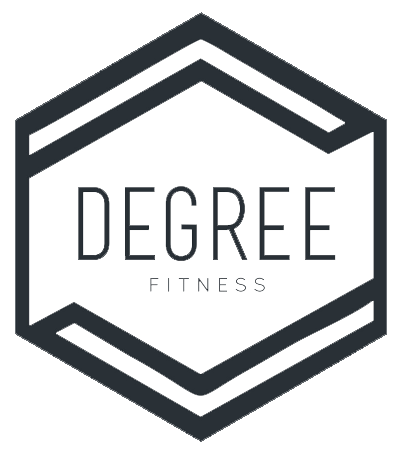Our Blog

Written By: Mairead, Registered Dietitian Nutrition labels can be confusing! But they're on packaging to help you know more about your food so you can make choices that align with your health and fitness goals. Grab your nearest food label. On the black and white Nutrition Facts table, you'll see a list of nutrients with values beside them. For most of them, there will be an amount in grams or milligrams listed on the left and a percentage over on the right hand side. That percentage can help give us context! As you'll see listed in teeny writing at the bottom of the table, 5% is a little, 15% is a lot. This means that if there's a nutrient we want more of, like fibre, we want that percentage to be higher, ideally towards 15% or more. If there's a nutrient we want less of, we want it to be closer to 5%. For most normal healthy people, we want to have less sodium (salt), sugar, and saturated fat, while including more fibre. There may also be times when you want to focus on a specific vitamin or mineral, like iron or calcium. These are also listed with a percentage and can be used the same way. A key part of label reading is knowing what is most important for you. For many food categories, you can't prioritize everything. There may not be one product that is the lowest in saturated fat AND the lowest in sodium AND the highest in fibre AND has the most protein AND has the most iron ... the list could go on. But if you can narrow it down to a couple things that matter most for your health and fitness goals, you can start making choices based on food labels, without all the overwhelm. Check out your food labels, use the percentages, and make choices that fit with your goals! Looking for more personalized nutrition advice? Let's chat! Email mairead@degreefitnessseaforth.com for more information about our Nutrition Programs, or click HERE to book your FREE Bite-Sized Nutrition Chat!
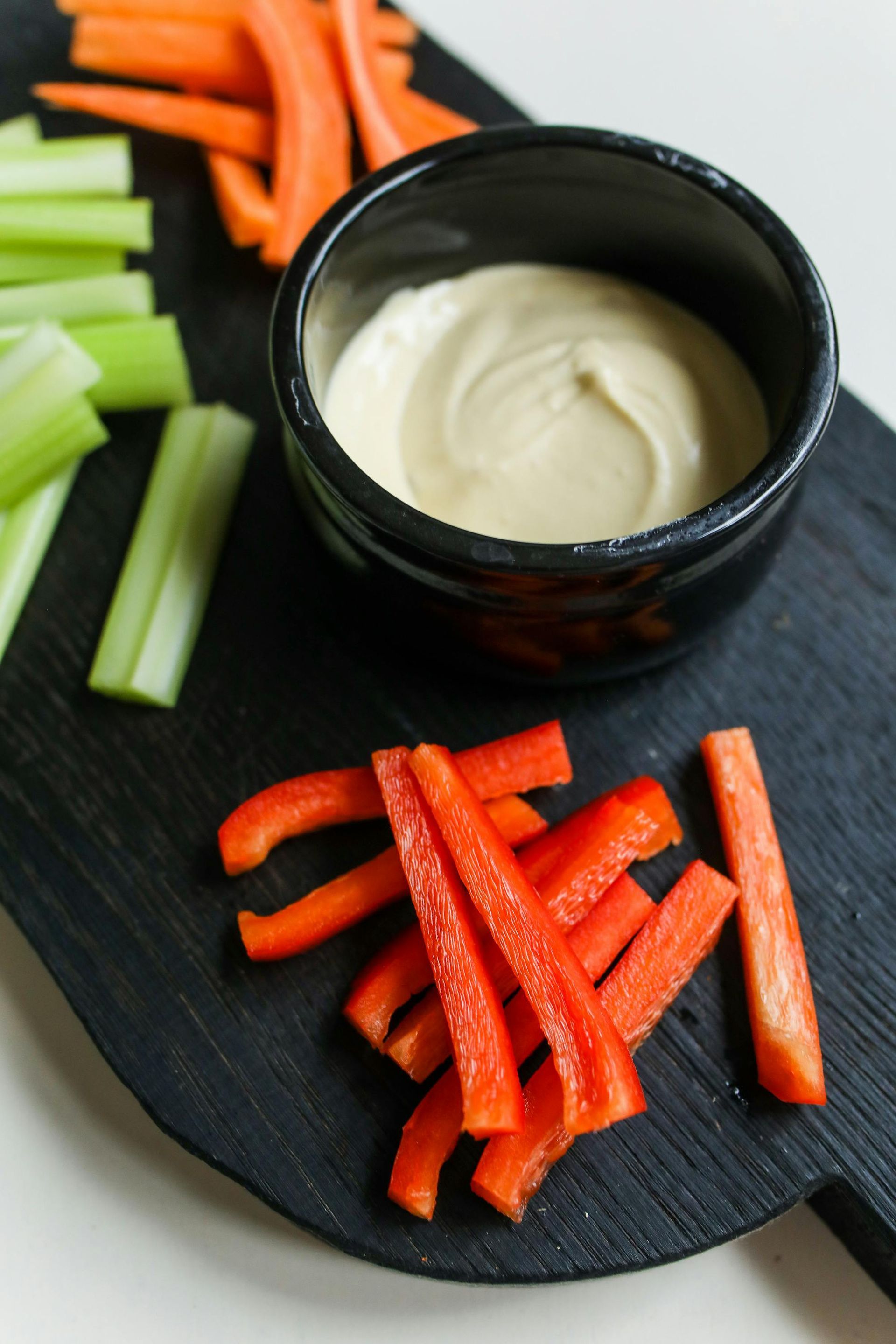
Written By: Mairead, Registered Dietitian Snacking causes a lot of worry for many people! Is snacking bad? When should we be snacking? What's the best snack? Snacking itself isn't a bad habit, unless it's not aligned with your health and fitness goals. Snacks can actually do a lot of good to keep our energy levels up throughout the day and help meet our nutrition needs. Let's check out four ways you can improve your snacking habits! 1. Think about why! If you're concerned about whether your snacks are a problem, it's worth thinking about why you're snacking. Are you hungry between meals? Do you need some fuel before or after a workout? Are you bored at work in the afternoon or need a pick-me-up? Do you need something to do with your hands while watching tv? Are you starving at the end of the day when you get home before you have a chance to make dinner? Snacks serve lots of purposes, from keeping our energy stable during the day, to meeting emotional needs. If you don't feel good about why you're snacking, it might be time to find some other way to meet that need. 2. Plan for your snacks! Often, we may know we need a snack, but not be able to make a healthy choice about it because we're too busy or just too hungry. A little planning goes a long way! Planning ahead for these times can help us make choices that align with our goals, and have something at the ready before we're too hungry to make that healthy choice. Pack a snack or have one at the ready during the times of day or situations when you know you'll need it. 3. Make them satisfying! If a snack isn't satisfying, we'll be reaching for something else soon. For longer lasting energy, choose snacks that have a combination of protein and carbs. This might include yogurt with berries, a higher protein granola bar, crackers and veggies with hummus, or even a couple handfuls of trail mix. If you find yourself finishing your snack without even noticing what you've eaten, try taking a minute to eat more mindfully and focus on your food. This will help you feel more satisfied with it! 4. Fill your nutrition gaps! Snacks are another opportunity to add nutrition to your day. Are there specific foods you're trying to add more of to your diet? Are there nutrients you feel you may be lacking? Use snacks as a way to add these in. If you're concerned about protein, try adding canned tuna, hardboiled eggs, or Greek yogurt to your snacks. If you feel you're lacking vegetables or fruit, include at least one in your snack. If you're trying to include more plant-based proteins, lean on bean-based dips or try roasted chickpeas. The options are endless! Remember, snacking isn't good or bad, and can serve a lot of different purposes. Try using these tips to help your snacking align better with your health and fitness goals! Looking for more personalized nutrition advice? Let's chat! Email mairead@degreefitnessseaforth.com for more information about our Nutrition Programs, or click HERE to book your FREE Bite-Sized Nutrition Chat!

Written By: Mairead, Registered Dietitian As a Dietitian, I work with a lot of different people. One common thread is that we talk about excuses. So many people come in to a nutrition consultation and tell me about their challenges with nutrition and fitness, and then follow it up by saying something along the lines of "I know these are just excuses, I can do better". The things we often consider excuses can include having a busy job and a busy family life. Working weird hours. Struggling with the cost of groceries. Caring for loved ones. Managing health concerns, chronic diseases, or injuries. The list goes on. For my nutrition clients, I rarely consider any of these things to be excuses. It's not an excuse that you can't eat well because you work long hours and then take your kids to their sports practices - these are very real reasons why you're struggling to make healthy choices. It's not an excuse if you work nights and need to get some sleep so you didn't make it to the gym - it's as aspect of your life that makes getting enough exercise challenging. Think about the things you might consider to be your excuses for not "doing better" with your health and fitness. Are they really just parts of your life or the season you're currently in? None of these things should be making you feel bad or like you're making excuses. But on the flip side, these reasons also don't mean we need to throw in the towel on our goals entirely. They mean we might need to get a bit creative, decide what's really important to us right now, and ask for help when we need it! Instead of feeling bad about your "excuses" that aren't really excuses, it might be time to find some new ideas. Working with a Dietitian can be a great way to figure out what's actually important in your health and fitness goals, and come up with some new ideas to get you there. There are always steps we can take in the right direction to move past those "excuses" and work together for a happier and healthier you! Looking for more personalized nutrition advice? Let's chat! Email mairead@degreefitnessseaforth.com for more information about our Nutrition Programs, or click HERE to book your FREE Bite-Sized Nutrition Chat!
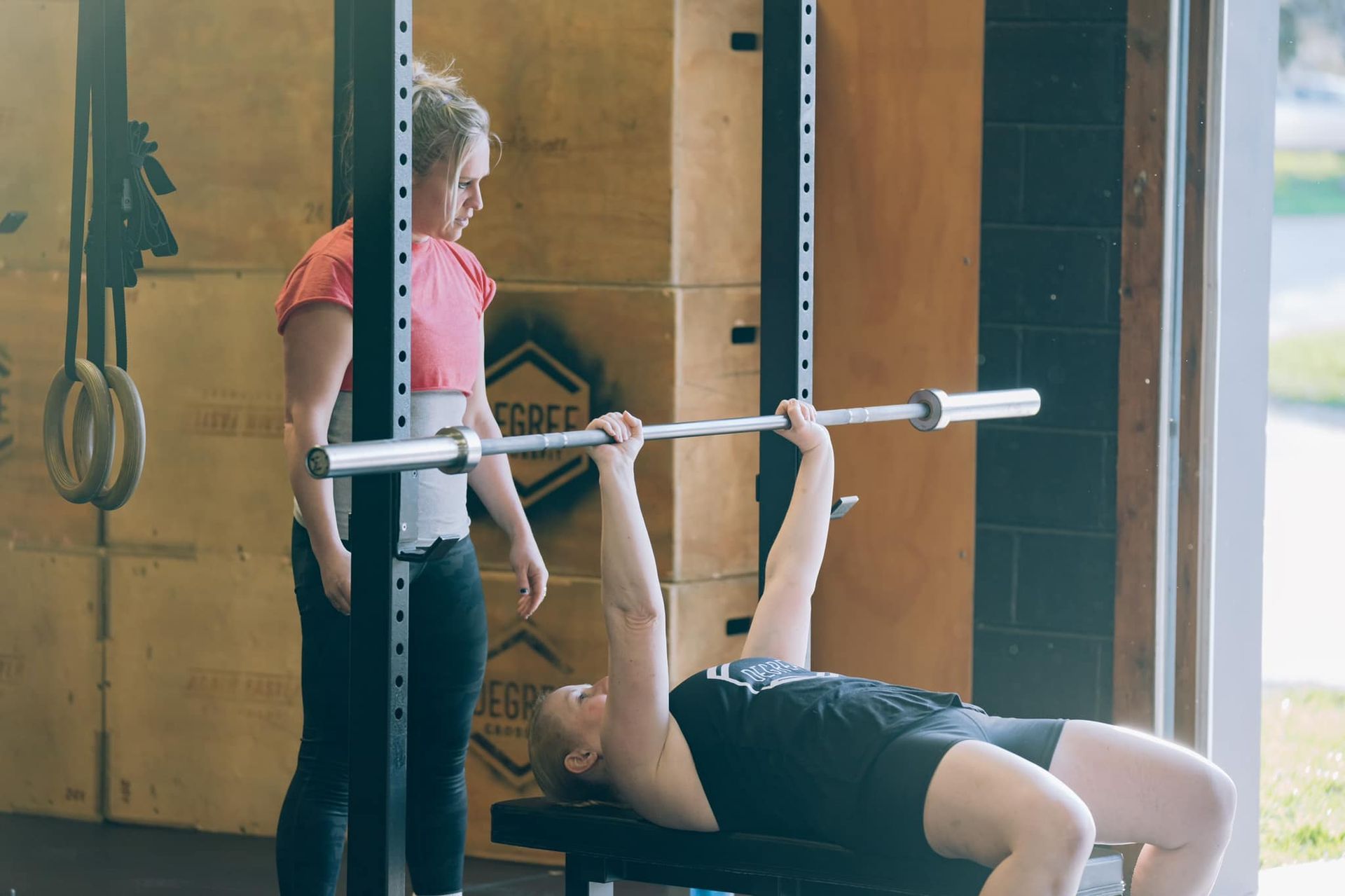
Written By: Coach Kelly Have you heard... "You’re too old, you’re too tired, you’re too X Y Z" to workout? WRONG! Did you know that the more you move, the less likely you are to experience injuries? The less likely you are to trip, slip or fall. If these things happen, you are less likely to be severely injured. We’ve worked with many different people over the almost 10 years that Degree has been around; hip replacements, knee replacements, strokes, members that experienced an injury outside of the gym but still came to class, etc. We often put ourselves in a box that “I can’t because…”. But, is that true? What if you just tried? Moving keeps us healthy and independent; movement also promotes recovery when done appropriately. So, how do you stick to a fitness routine? Why does it matter? And believe me, it really, really does matter. Keep it simple. I saw the most changes in my fitness/health when I ate well and exercised regularly. I didn't starve myself, I didn’t do any low fat things, I didn’t have to take any extra supplements. I just ate well, trusted the process and moved my body. Now, keep in mind things are different for me than they were 3 years ago; I have a 14 month old and a 3 year old at home. Am I tired? Yep! Do I always get a full nights sleep? Nope, never. Do I have more stress now than then? 100%. However, my why stays true. I want to grow old with power and strength. I want to keep up with my boys and beat them in races as long as I can. I don’t want to be at the Doctors office all the time (even though our local Docs are amazing!). I don’t want to be at the mercy of someone else for my own health. You have the amazing opportunity to keep moving. You have friends, family, jobs, groups and an entire world that wants you to feel good. To feel happy, healthy, strong, and not question if you can go for the bike ride, or be scared to take the stairs. The next best thing you can do if you’re stuck? Ask for help. When our cars break down we take them to the mechanic. When we need a teeth cleaning we go to the Dentist. When we have a tax question we go to the accountant. The world is saturated with health and fitness fads - most of which isn't always the best. Ask for help - Talk to a Coach that can help you leaf through what Google is telling you to find out what will actually work for you, and help you create a habit that works. Ready to get started? Email info@degreefitnessseaforth.com or call/text 519-441-7492!
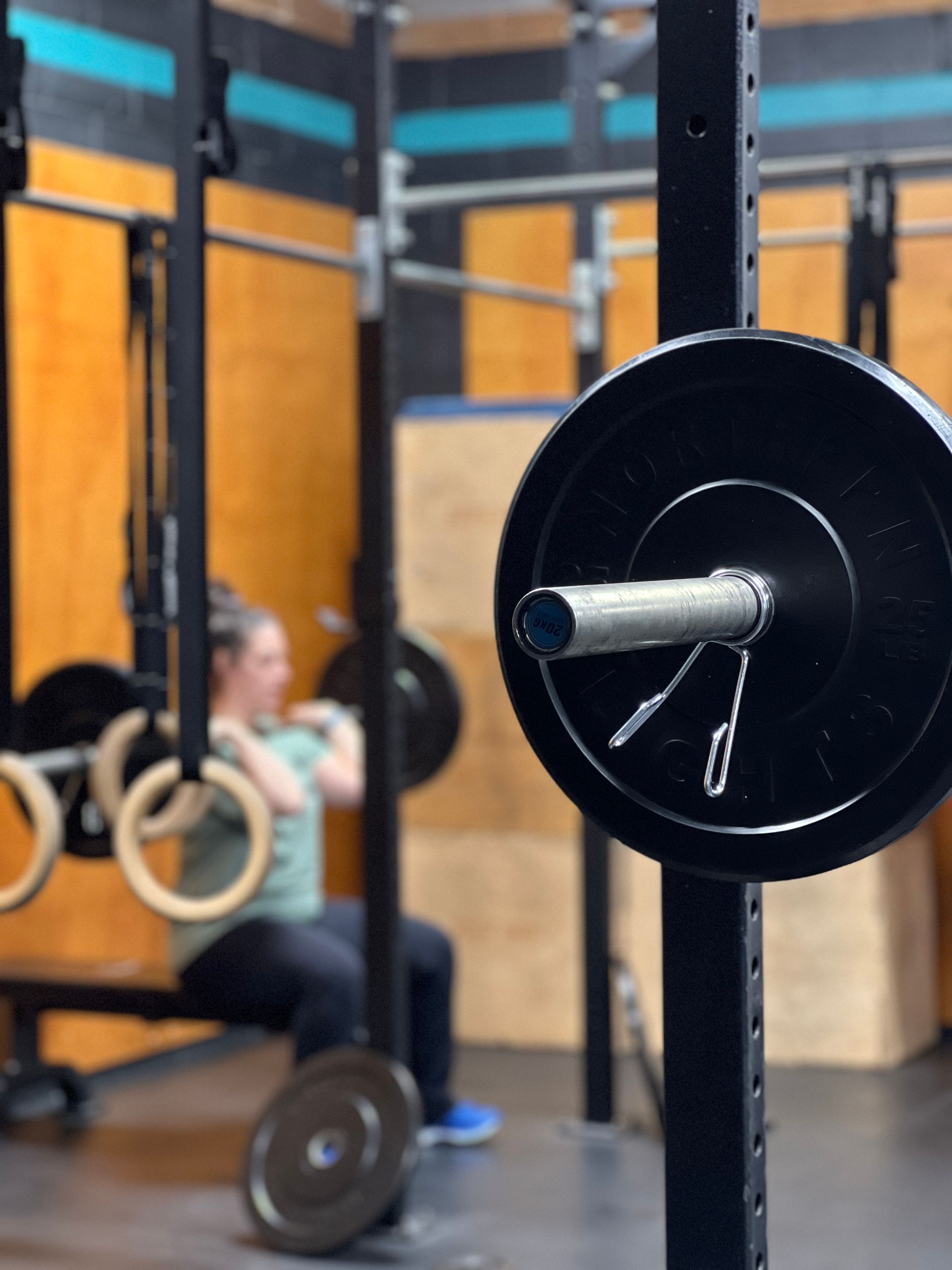
Written By: Coach Kelly Coach Kelly here - I’m here to talk today about what fitness really is, and what really matters. It’s not how much you weigh; It’s not your clothing size; It’s not have a 400lb deadlift; It’s not having 6 pack abs… Before we dive into it, I want to share my personal experience with fitness and how I’ve made it a non-negotiable. Something I’ve carried with me through highschool, college, working long hours as a home-care PSW, joining a gym (Degree!), managing the gym and then running it. In all those years this included job changes, moving, having two babies close in age, and all the ups and downs that life throws at us in between. I got into fitness because my sweet Mother was doing Pilates videos (the VHS kind) at home. It looked fun, I liked hanging out with my Mom so I gave it a try. That was the catalyst. I felt empowered; I felt strong. I was never athletic in high school, I didn’t play sports until grade 11 when a friend of mine introduced me to cheerleading. That became a big part of my life. Through this as well, I tried allll of the things to lose weight, get smaller, find my 6 pack… you name it. I tried the low fat everything fad; I tried the ice cold water with lemon first thing in the morning; I tried the Raspberry Ketones; I tried not eating after 8pm; I tried cheat days etc... And guess what? Nothing changes. Literally nothing. I was spending money on things that didn’t work; I was letting the magazine covers and the celebrities tell me that to be fit I needed to be smaller, I needed to weigh less. Before we get into what actually worked, let’s talk about what doesn’t and get Myth busting Myth 1 Your weight is the most important factor in your overall health and fitness. WRONG! Your bodyweight is simply everything that you are; your bones, muscles, organs, blood, hair, eyeballs, if you’ve gone to the bathroom or not, the food you’ve eaten, the water you’ve drank. You’ve probably heard of BMI (Body Mass Index). This is troublesome as it only measures your height compared to your weight. The shorter you are and the more you weigh, the higher your BMI, thus, we are labeled overweight when we really might not be. The taller you are, and the lower your weight, your BMI is lower, thus, we are labeled as healthy, when we really might not be. The markers that we want to look at (unless there is a medical reason to look otherwise) are things like muscle mass, body fat percentage and other non-scale markers like how stressed you feel (or not), how are you sleeping at night, are you happy? Our genetics play a massive role in our body type; understanding this can also help us work with our body instead of against it. There is a point at which your body will be at a weight it is likely to stick around unless drastic changes are made. For most of us the changes needed are simply unrealistic and. There are many important factors to your overall health & fitness, but bodyweight usually is not the one we need to focus on. Book your Intro Meeting by CLICKING HERE , or reply directly to this email if you're feeling overwhelmed, stuck or frustrated in your fitness journey. We can help!
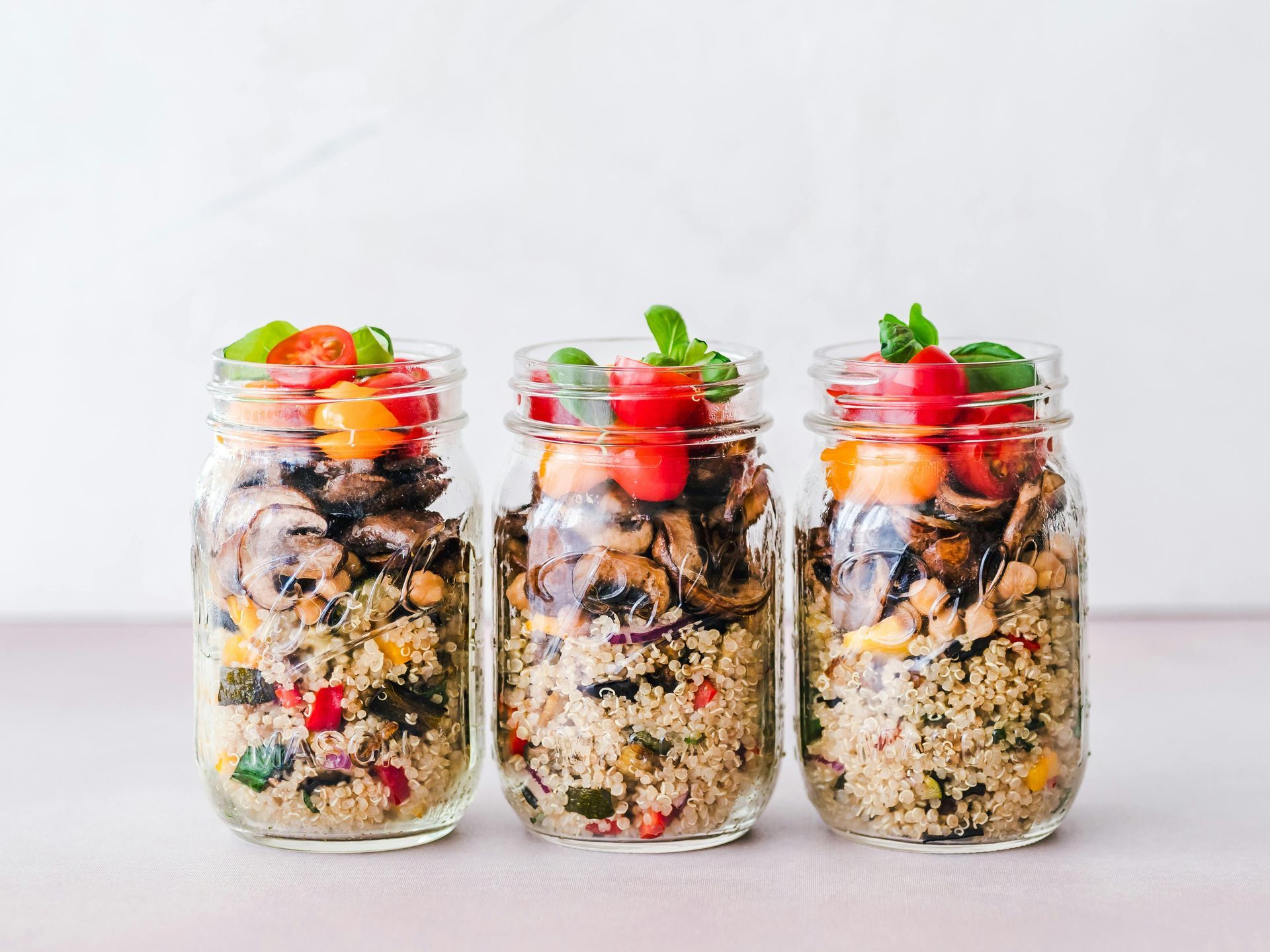
Written By: Mairead, Registered Dietitian For many of us, fall brings a return to routine and a change in schedule. Maybe you have kids heading back to school, or maybe you have a more consistent work schedule after a summer of fun plans. Or maybe that old back-to-school energy just has you wanting to set some goals. Whatever it is, fall is the perfect time to get back on track with your fitness and nutrition goals! Check out these 5 ways you can work on getting back on track this fall! 1. Make sure you're drinking your water! Drinking enough water is a small step in the right direction. If you've had a busy summer, maybe hydration hasn't been top of mind! For most normal healthy people, aiming for 2-3L of water a day is a reasonable goal. If you're well below that, try aiming for just one extra glass a day and increasing slowly from there. Bonus: one small healthy change often leads to others. Drinking your water could get the ball rolling! 2. Do some meal planning! Meal planning doesn't have to be rigid or complicated. If you're constantly standing in front of the fridge at 6pm wondering what to eat, meal planning can fix that. If you're constantly stuck throwing out random ingredients you didn't know how to finish, meal plannign can fix that. If you bring home groceries but then don't know what to do with it, meal planning can fix that. If you're eating more take out than you'd like because you didn't have a plan, meal planning can fix that. Even thinking a day or two ahead can help you cut the stress at meal time! 3. Get realistic about what you can manage! Before you start overhauling everything, take a second to look at what this season really looks like for you, and what kind of health and fitness goals could be achievable. Maybe a return to routine means you can workout every day of the week now - fantastic! Maybe a change in routine means you need to explore different times to get to the gym and other ways of moving your body - also fantastic! Maybe you're home more this fall and will be cooking more - amazing! Maybe you're going to be busier and need to expore quick and healthy meal ideas - also amazing! Figuring out how to match your goals to your real life right now is key to actually making changes that stick. 4. Shop your kitchen! If your summer was busy, it's time to take stock of what's in your kitchen. Check your fridge, freezer, and pantry cupboards. Is there anything that should be used up that you can plan meals around in the next couple weeks? Are there staple items you count on for easy meals that you need to restock? Could you cut your grocery spending down for a week or two by trying to use what you have so nothing goes to waste? If you have the time for it, this is the perfect time to take stock of what you have and make the most of it! 5. Book a check-in or ask for help! Sometimes we just don't know where to start or what to do. Sometimes we're so busy living our lives that it's hard to see possible solutions to our health and fitness struggles. That's when it's time to ask for help. This might mean asking a friend for meal planning ideas or to set a regular time to go for a walk. It also might mean booking a No Sweat Intro at Degree to learn more about programs, checking in with your coach if you're feeling like something needs to change, or meeting with a Registered Dietitian to set some nutrition goals that will work for you in this season. There's nothing wrong with needing a bit of help! Looking for more personalized nutrition advice? Let's chat! Email mairead@degreefitnessseaforth.com for more information about our Nutrition Programs, or click HERE to book your FREE Bite-Sized Nutrition Chat!

Written By: Coach Sienna Showing up for yourself is so important but its often overlooked and dismissed. Showing up for yourself isn't some cheesey, made up statement. There is meaning behind it and science! Showing up for yourself is an empowering practice that can transform the way you live, love and lead! BUT what does showing up for yourself actually mean? And why does it matter so much? S howing up for yourself is... Not Selfish You matter and you are important! Treat yourself as if you were a loved one. It means honoring your own needs, values and well being to achieve overall wellness. This means being consistent in the way you treat yourself, not just when it's convenient to you! It is…. Keeping your word to yourself and keeping those promises Choosing rest to prevent burnout It means giving yourself grace and speaking kindly to yourself (Its your first time living!) Prioritizing growth even if its uncomfortable Creating boundaries and sticking with them Say No when something doesn't align with you or your beliefs I t's about treating you like you are worth caring for not only when you have “deserved it” but because you are worth that care, always! Why does all of this matter? It strengthens your relationship with yourself Prevents you for burning or crashing out Builds self confidence as well as trust in yourself Helps you stay balanced emotionally and physically The more time you spend getting to know yourself you learn and discover hobbies! You learn that YOU CAN DO IT and that YOU CAN DO HARD THINGS! You become more present for others! You are no longer pouring from an empty cup! What does this look like in real life? Drinking enough water even though you would rather skip it Going on a walk or doing meditation to have time for yourself to avoid crash out Keeping promises you said you would Letting go of perfection and simply doing the best that you can with what you've got S tart showing up for yourself today! Let yourself know that you've got you :) --- To inquire about services, programs or to get started email info@degreefitnessseaforth.com or call/text 519-441-7492!
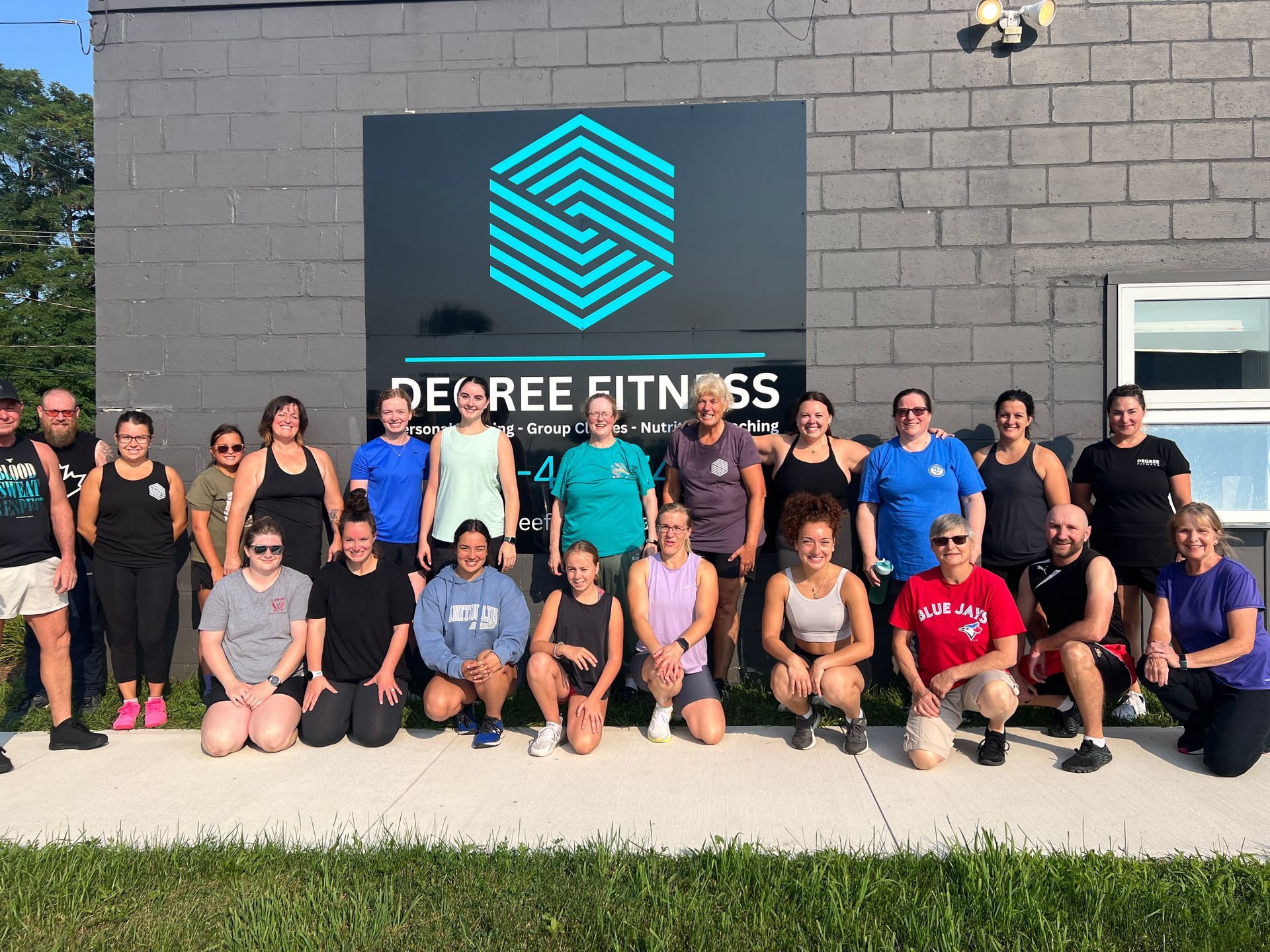
Written By: Coach Kelly I’ve been exercising since high school... I don’t want to age myself tooooo much ;) but that was quite sometime ago. I meet with people all the time who are looking to get started. They are looking to lose weight, tone up, feel better, happier, increase bone density, do something for them, for various reasons. I’m going to give you two of the most important things that you need to do to make your fitness stick, through al season nd all set backs. Write these down, memorize them, and repeat them over and over. You’ll always succeed. Forget about motivation Seriously, forget it. Motivation comes after you get started. It comes when you start to see results; it comes when your pants fit different; it comes when you’re not out of breath going up stairs; it comes when you are running down the soccer field with your kids; it comes when you are happier; it comes when you feel less anxious, less depressed; it comes after you get started. Remember your why Why are you wanting to get started? Why do you want to spend money and time at a gym? Are you willing to do this for months, if not years? When your schedule gets busy, or your kids get sick, why will you keep coming to classes or appointments? You just need to get started, and you need to clearly understand why you are starting in the first place. After that, you must stick with it. Even when y you’re tired, when you’re frustrated, when you want to give up. Everyone wants the quick fix. We will spend hundreds, if not thousands of dollars on supplements that promise to help us lose weight, feel better, but honestly, nothing will compare to the eating some vegetables and getting in a structured workout with a Coach or at a gym 2 - 3 times per week. I know it’s hard. I know it’s hard. Like, I really, really know it’s hard. But, as you’re reading this, look way down the road, like 1 year, then 3, then 5 years. How do you want to feel? As hard as it is to get started, it will be even harder if you don’t do anything. You deserve to invest in yourself. You deserve to feel good. You have got this and we believe in you - Let’s go! ----- To inquire about services, programs or to get started email info@degreefitnessseaforth.com or call/text 519-441-7492!

Written By: Coach Kelly My gym ownership journey started in December of 2019. At the time I was managing the day to day Degree, coaching classes/appointments and running events/programs. The previous owner had some really exciting things coming up in her life that required big changes. One of them being handing over the keys to someone else. It was an immediate yes, and an absolute honour! Degree was originally founded as a place to workout with a group of like minded, amazing people. Using fitness as a vehicle for a better overall life (happier people, healthier people). I always believed int eh original mission, vision an values of Degree and they haven’t changed much over the years :) Fitness to me was a way to escape; I could move my body, stay strong and feel empowered when everything else around me felt like it was falling apart. I’ve continued to use fitness to improve my overall health and strength, and just like when I first started, to stay grounded when everything else feels shaky. Fitness to me, and at Degree, is more than muscles. It’s helping our clients have a safe space they can come, be themselves, and workout with their gym buddies. As they do this, the most amazing things happen, and it makes our hearts soar as you Coaches… We see you light up when you crush a hard workout, or do something you didn’t think you could do. When you share a bright spot and everyone in your class is genuinely happy and excited for you, too! When you start to realize, and believe , that you are whole heartedly capable of anything you put your mind to. That you are worth it; you always have been. Degree is the cornerstone of health and wellness, and we will always be here to help you, and our community live their happiest, and healthiest lives! ----- To inquire about services, programs or to get started email info@degreefitnessseaforth.com or call/text 519-441-7492!
